一般过去时课件(PPT)
合集下载
一般过去时-ppt课件

played /d/
wanted
listened
/Id/ liked
;.
9
我们一起来看结果:
walked
/t/
visited
played /d/
wanted
listened
/Id/ liked
;.
10
一般过去时解题宝典
;.
11
否定句的改写:
当句中含有be动词was,were 时, was,were和not搭配,构成wasn’t , weren’t,其他顺序不变,some变any。
usually
last Mid-Autumn Festival
every day three days ago on Mondays
tomorrow a moment ago 14 years ago
;.
4
跟着节拍唱一唱吧
一般情况加ed; 若遇词尾哑巴e, 加d轻松就搞定; ty,ry和dy, 改y变i加ed; 规则变化挺简单, 其他功夫不可少; be动词,很重要, 过去要变was、were。
;.
18
请你来挑战:
6. Did you _____ (call)camll e last Sunday?
did
do
7. What ______ you _____ (do) last night?
did 8. Where _____ (do) you live last year? 9. What time did you ______( get) up this mgeotrning? 10. How ______ yoduid_______( go) to schooglobefore?
一般过去时(公开课)ppt课件

Santa Claus’s trip to the world
Watch a video
精选ppt课件2021
1
Santa’s Trip to Changping
一般过去时 The simple past tense
From: 望牛墩精中选ppt学课件2021By: Miss Xia
2
Hello ! Merry Christmas !
3. What did he do in those cities?
He _s_e_n_t_/g_a_v_e__ Christmas
presents to some sick children.
精选ppt课件2021
4
What did Santa do last week in China?
1.He _b_o_u_g__h_t a Christmas tree and some
presents. A. buy B. bought
2. He _s_e__n_t __
some Christmas
cards to his friends.
A. sent B. send
精选ppt课件2021
5
What did Santa do last week in China? 3. He _h__a_d___ a big dinner with children.
13
The simple Past Tense一般过去时的结构
Is there a card in the box ? Was there a card in the box ?
1. Did you receive a Christmas present last year?
Watch a video
精选ppt课件2021
1
Santa’s Trip to Changping
一般过去时 The simple past tense
From: 望牛墩精中选ppt学课件2021By: Miss Xia
2
Hello ! Merry Christmas !
3. What did he do in those cities?
He _s_e_n_t_/g_a_v_e__ Christmas
presents to some sick children.
精选ppt课件2021
4
What did Santa do last week in China?
1.He _b_o_u_g__h_t a Christmas tree and some
presents. A. buy B. bought
2. He _s_e__n_t __
some Christmas
cards to his friends.
A. sent B. send
精选ppt课件2021
5
What did Santa do last week in China? 3. He _h__a_d___ a big dinner with children.
13
The simple Past Tense一般过去时的结构
Is there a card in the box ? Was there a card in the box ?
1. Did you receive a Christmas present last year?
一般过去时态ppt课件

2、表示过去经常或反复发生的动作。 My father often went to work by bus last year. When I was a child, I often listened to music.
可编辑课件PPT
9
6.练习
1.They_w_e_re(be) doctors last year. 2.You _h_a_d(have) a class this morning. 3.She_ra_n_ (run) very fast yesterday.
passed cooked
2、元浊 /d/ ,即 ed 在元音,浊辅音后面念 /d/ ,
例:borrowed enjoyed
called moved
3、/t/ /d/ 之后念 /id/ , 即 ed 在 /t/ /d/ 音后面念 /id/
可编辑课件PPT
例:wanted shouted needed counted6
4.一般过去时的否定和一般疑问句 1)We had a good time yesterday.
We didn’t have a good time yesterday. Did you have a good time yesterday? 2)She was a teacher in 1980s.
4.She_s_tu_d_ied (study) Chinese two years ago. 5.He_p_la_yed(play) tennis last week.
6.He found an amusing book.(变否定和一般疑问)
He didn’t find an amusing book.
stop stopped plan planned
初一英语语法:一般过去时(共22张PPT)
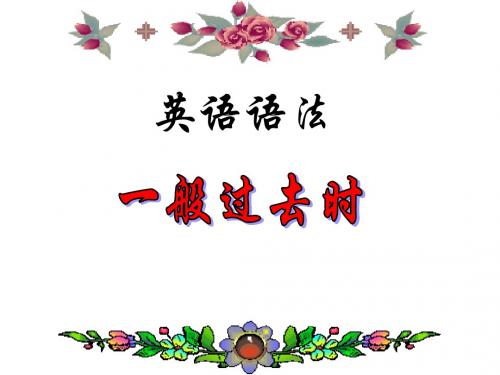
cost →cost花钱
read→read读书
cut → cut 砍,剪 hurt → hurt受伤
2)变元音字母为a run→ran跑
give→gave给 sing→sang唱歌
come → came过来 drink→drank喝 swim→swam游泳
sit→sat坐下 begin→began开始
feel build fight give teach sing buy cut come draw drink drive hope use start
felt built fought gave taught sang bought cut came drew drank drove hoped used started
2. watch, John, did, TV, weekend, last. _J_o_h_n_d_i_d_w_a_t_ch__T_V_l_as_t_w_e_e_k_e_n_d_. ___________
3. went, I ,to, by, park, a, bike
_____I _w_e_n_t_t_o__a_p_a_r_k_b_y__b_ik_e__. ___________ 4. jumped, the, into, lake, he, and, the, to, swam, kite.
19) My sister _w_a__s_ (be) born on June 5. 1996. 20) W__e_r_e_ (be) your parents at home just now? 21) He _s_tu__d_ie_d_ (study) French here last year. 22) She __d_i_d_ (do) homework last night. 23) They _w__e_n_t(go) to the zoo yesterday morning. 24) We __h_a_d_ (have) a party last Saturday. 25) Joy _v_is_i_te__d (visit) me yesterday evening. 26) They __l_iv_e_d_ (live) here two years ago. 27) He _w__a_s_(be) here a moment ago.
一般过去时课件(PPT)

B pictures in the park 1.I ___
Exercises
last weekend. A.take B.took C.was D.draw
A 2. Did you ___football yesterday. A. play B. played C. were D. are
A 3.He always _____me last term. A. helped B. helps C. helping D. help 4.Where did you ___last B Monday? A.went B.go C.do D.did
climbed a mountain
mped
fly kites read a book sing and dance eat good food
swim do am/is are study
flew kites read a book sang and danced ate good food
6. He usually gets ____ (get) up at 6 getting in the morning. Look! He is ______ (get) up now. But yesterday he got (get) up very late, so he ____ went (go) to school late. He was ____ ___ (be) late for school.
动词原形、第三人称单数 动词过去式
They don’t watch TV in the evening. didn’t watch TV last night. They _________
She doesn’t play basketball after school. She _________ didn’t play basketball after school yesterday. Do you go to school on foot every day? go to school on foot yesterday. ___ Did you __ Does he go to school by bus every day?
讲解(一般过去时)ppt课件

4
句型变化 1.系动词be
陈述句(肯定): She was a doctor two years ago. 陈述句(否定): She was not a doctor two years ago. 一般疑问句: Was she a doctor two years ago?
肯定回答:Yes, she was. 否定回答:No, she wasn’t. 特殊疑问句: When was she a doctor?
5
动词一般过去时,表示过去发生的事; be用was或用were, have,has变had; 谓语动词过去式,过去时间坐标志; 一般动词加-ed,若是特殊得硬记。 否定句很简单,主语之后didn’t添; 疑问句也不难,did放在主语前; 如果谓语之前有did,谓语动词需还原; 动词若是was,were,否定就把not添。
• 为什么她去年离开了学校? Why did she leave the 时
• 1.定义: 1)表示过去某个时间发生的动作或存在的状态,常和 表示过去的时间状语连用;2)也表示过去经常或反复发生的动 作,常和表示频度的时间状语连用。
• 标志性状语
2.时间状语:yesterday last night
6
7
8
• 1. look • 4. carry • 7. call • 10.like • 13.dance • 16.stay
2. live 5. hope 8. finish 11.play 14.cry 17.cook
3. stop 6. trip 9. want 12.watch 15.plan 18.invent
3. _____________________ on Sundays. They went to the park last Monday.
句型变化 1.系动词be
陈述句(肯定): She was a doctor two years ago. 陈述句(否定): She was not a doctor two years ago. 一般疑问句: Was she a doctor two years ago?
肯定回答:Yes, she was. 否定回答:No, she wasn’t. 特殊疑问句: When was she a doctor?
5
动词一般过去时,表示过去发生的事; be用was或用were, have,has变had; 谓语动词过去式,过去时间坐标志; 一般动词加-ed,若是特殊得硬记。 否定句很简单,主语之后didn’t添; 疑问句也不难,did放在主语前; 如果谓语之前有did,谓语动词需还原; 动词若是was,were,否定就把not添。
• 为什么她去年离开了学校? Why did she leave the 时
• 1.定义: 1)表示过去某个时间发生的动作或存在的状态,常和 表示过去的时间状语连用;2)也表示过去经常或反复发生的动 作,常和表示频度的时间状语连用。
• 标志性状语
2.时间状语:yesterday last night
6
7
8
• 1. look • 4. carry • 7. call • 10.like • 13.dance • 16.stay
2. live 5. hope 8. finish 11.play 14.cry 17.cook
3. stop 6. trip 9. want 12.watch 15.plan 18.invent
3. _____________________ on Sundays. They went to the park last Monday.
一般过去时(共22张PPT)
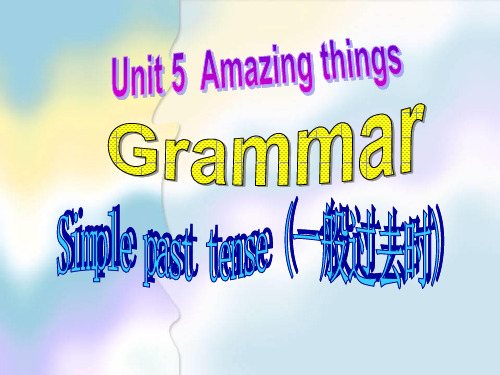
Finish Part C on page 62.
Millie: We _____ went (go) to the Fun World Museum the day before yesterday, Daniel. It ____ was (be) so interesting! Daniel: Really? Tell me all about it. Millie: OK. We ____ saw (see) a small monkey, only 11 centimetres tall. Daniel: That’s amazing! What else? Millie: We also _____ learnt (learn) about some strange birds like dodos. They _____ lived (live) on the earth a long time ago. Daniel: That’s cool!
一般过去时的否定句 (1)be动词的否定句
I/He/She/It You/We/They
was
were was not were not at home yeou/We/They
at home yesterday.
一般过去时的否定句
(1)be动词的否定句
1.Alice was outside one sunny day. Alice wasn't outside one sunny day. 2.Mary was at home yesterday. Mary wasn't at home yesterday. 3.We were in Beijing last week. We weren't in Beijing last week.
小学英语小学英语语法课件-一般过去时 (共37张PPT) 全国通用
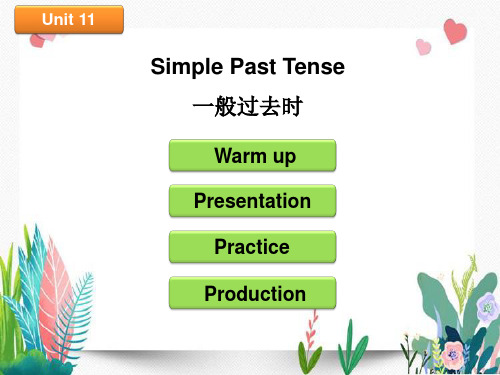
Presentation Sentences
一般过去时的主要用法和概念:一般过去时表示在过去某时 发生的动作或存在的状态,常与表示过去的时间状语 yesterday, last week, ago等连用。
一般过去时的用法: ① 表示过去时间里发生的动作或存在的状态,常与表示过去 的时间状语yesterday, last year, ago, the day before, yesterday, just now等连用。 ② 表示在过去一段时间里,经常性或习惯性的动作或状态, 常与always, often, usually等连用。
一般疑问句:a_t_t_h_e_l_iv_e__s_h_o_w_?_______________________ How many people were there at the
对划线部分提问:_l_iv_e__s_h_o_w_?________________________
Practice Oral Practice
Unit 11
Simple Past Tense 一般过去时
Warm up Presentation
Practice Production
Warm up
Free talking: What do you usually do on weekdays?
I usually get up at 6:00, I put on my clothes, make the bed, brush my teeth, wash my face. I have breakfast at 6:40, then wipe the table. I go to school at 8:00, and eat lunch at 12:00. Then I usually do my housework at 6:00, take a bath at 7:00, and watch TV at 7:45, and go to bed at 9:00.
小学英语一般过去时86314精品PPT课件 图文
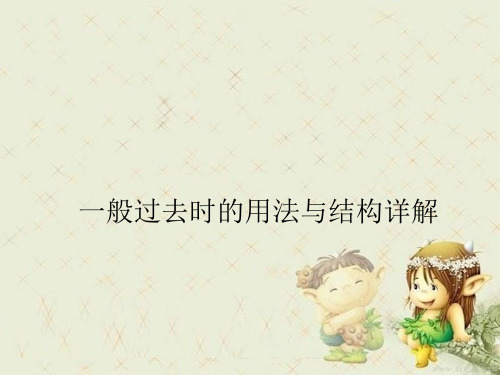
一般疑问句: Did they have a good time in the park?
肯定/否定回答: Yes, they did. No , they didn’t.
2. Ann did her homework yesterday evening.
一般疑问句: Did Ann do her homework yesterday evening?
肯定句: He was ill yesterday. 否定句:He was not ill yesterday.
肯定句:The cat ate a bird last night. 否定句:The cat didn’t eat a bird last night.
一般过去时的 一般疑问句
1.把was, were放在句首,其余位置不变。
肯定句: We were busy last week.
否定句: →We were not busy last week.
2.(行为动词类)要在行为动词的前面加助动词didn’t. 然后把 动词过去式改为动词原形。 即:didn’t + 动词原形
肯定句: She played the violin last night.
was were did
went had made got
eat
ate
say said
see saw
一般过去时 肯定句变否定句
Be动词类 • 否定句
在的状态 的句子中在was, were的后面加上not。
如: 肯定句:
He was in the park the day before yesterday. 否定句: →He was not in the park the day before yesterday.
肯定/否定回答: Yes, they did. No , they didn’t.
2. Ann did her homework yesterday evening.
一般疑问句: Did Ann do her homework yesterday evening?
肯定句: He was ill yesterday. 否定句:He was not ill yesterday.
肯定句:The cat ate a bird last night. 否定句:The cat didn’t eat a bird last night.
一般过去时的 一般疑问句
1.把was, were放在句首,其余位置不变。
肯定句: We were busy last week.
否定句: →We were not busy last week.
2.(行为动词类)要在行为动词的前面加助动词didn’t. 然后把 动词过去式改为动词原形。 即:didn’t + 动词原形
肯定句: She played the violin last night.
was were did
went had made got
eat
ate
say said
see saw
一般过去时 肯定句变否定句
Be动词类 • 否定句
在的状态 的句子中在was, were的后面加上not。
如: 肯定句:
He was in the park the day before yesterday. 否定句: →He was not in the park the day before yesterday.
一般现在时现在进行时和一般过去时和一般将来时态ppt(共26张PPT)
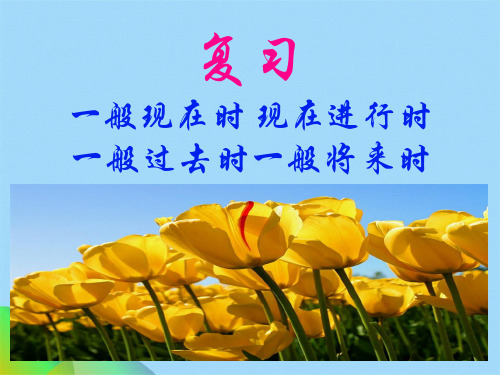
• e.g. I was born in 1980. • I was not born in 1980.
• Were you born in 1980?
第二种 含有行为动词的
• 肯定结构
• 主语+行为动词(过去式)+其它 否定结构
主语+didn’t+行为动词(原形)+其
它 一般疑问句结构
Did+主语+行为动词(原形)+其它?
看来将要发生的事或存在的状态。
• 肯定句:主语+ will+动词原形------
• There will be a computer on every desk in the future.
• 未来每个桌子上都将有一台电脑。 • It will rain tomorrow. 明天将要下雨。 • We will go to school on foot.
• 我们将步行去上学。
• 特殊疑问句:疑问词+一般疑问句?
• 一般将来时II: is/am /are going to + 动词原形的
用法。
• 1、主要用来表示打算或计划要做某事, 主语是人。
如: • She is going to learn Japanese next year. • There is going to be a football match tonight. • Dad and I are going to see Beijing opera this
未来每个桌子上都将有一台电脑。 今天下午我和爸爸打算去看京剧。
swim
chat
第二种 含有行为动词的
I am going to go swimming tomorrow(明天).
2.主语为非第三人称单数的情况
• Were you born in 1980?
第二种 含有行为动词的
• 肯定结构
• 主语+行为动词(过去式)+其它 否定结构
主语+didn’t+行为动词(原形)+其
它 一般疑问句结构
Did+主语+行为动词(原形)+其它?
看来将要发生的事或存在的状态。
• 肯定句:主语+ will+动词原形------
• There will be a computer on every desk in the future.
• 未来每个桌子上都将有一台电脑。 • It will rain tomorrow. 明天将要下雨。 • We will go to school on foot.
• 我们将步行去上学。
• 特殊疑问句:疑问词+一般疑问句?
• 一般将来时II: is/am /are going to + 动词原形的
用法。
• 1、主要用来表示打算或计划要做某事, 主语是人。
如: • She is going to learn Japanese next year. • There is going to be a football match tonight. • Dad and I are going to see Beijing opera this
未来每个桌子上都将有一台电脑。 今天下午我和爸爸打算去看京剧。
swim
chat
第二种 含有行为动词的
I am going to go swimming tomorrow(明天).
2.主语为非第三人称单数的情况
人教版七年级下语法教学:一般过去时(Present SimpleTense)课件(共23张ppt)

B: I … A: Oh, sounds great! B: I a...because my mother ….
I love her so much.
Past tense 过去式
regular change 规则变化
原形 过去式wasຫໍສະໝຸດ -__w__a_s_h__e_d__
love-__lo__v_e_d_ stop-__s_t_o_p__p_e_d_worry-__w__o_r_r_ie_ d
She taught me many things when I was little. She helped me with schoolwork when I began my schoolwork. She looked after me so well that I could grow up well. She did quite a lot of these things Just because she loved me.
He/She was really .... He/She taught me .... He/she also helped me.... For me, he/she made me.... .... I am really thankful to him/her.
grandpa, grandma, dad, mom, teacher, friend, volunteer…
On Mother’s last month, students did quite a lot of things for their mothers. Some students in our class ___d_id__a lot of things for mothers. Gina __b_o_u_g_h_t_(buy) a bunch(束) of carnations. Tom ____m__a_d_e___(make) a card by himself. Cathy thinks her mother works too hard, so she _c_le_a_n_e_d_(clean) the living room and __w__a_s_h_ed (wash) the dishes. But only Jimmy ____d__id_n_’_t _d_o__ (not do) anything. He __d_i_d_n_’t_d__ec_i_d_e__(not decide) what to do. All of us hope that our mothers will like these gifts.
I love her so much.
Past tense 过去式
regular change 规则变化
原形 过去式wasຫໍສະໝຸດ -__w__a_s_h__e_d__
love-__lo__v_e_d_ stop-__s_t_o_p__p_e_d_worry-__w__o_r_r_ie_ d
She taught me many things when I was little. She helped me with schoolwork when I began my schoolwork. She looked after me so well that I could grow up well. She did quite a lot of these things Just because she loved me.
He/She was really .... He/She taught me .... He/she also helped me.... For me, he/she made me.... .... I am really thankful to him/her.
grandpa, grandma, dad, mom, teacher, friend, volunteer…
On Mother’s last month, students did quite a lot of things for their mothers. Some students in our class ___d_id__a lot of things for mothers. Gina __b_o_u_g_h_t_(buy) a bunch(束) of carnations. Tom ____m__a_d_e___(make) a card by himself. Cathy thinks her mother works too hard, so she _c_le_a_n_e_d_(clean) the living room and __w__a_s_h_ed (wash) the dishes. But only Jimmy ____d__id_n_’_t _d_o__ (not do) anything. He __d_i_d_n_’t_d__ec_i_d_e__(not decide) what to do. All of us hope that our mothers will like these gifts.
一般过去时讲解PPT课件

。
did
助动词,用于构成一般过去时的 疑问句和否定句。
主语
句子中的动作执行者,可以是名 词、代词等。
例如
What did you do yesterday? 你 昨天做了什么?
其他成分
包括宾语、状语等,根据句子需 要而定。
动词原形
指动词的基本形式,即不加任何 时态或语态标记的形式。
特殊疑问句实例分析
when、after、 before、as等引导的 表示过去的时间状语 从句。
已经、曾经、刚才、 那时等表示过去的时 间副词。
02
一般过去时肯定句结构
主语+动词过去式+其他成分
01
02
03
主语
句子中的主体,可以是人 、物或抽象概念。
动词过去式
表示过去某个时间里发生 的动作或状态。动词的过 去式可分为规则变化和不 规则变化两种。
表示过去某个时间里发生的动 作或状态。
用法
陈述过去的事实或情况,描述 过去经常或反复发生的动作。
现在完成时
表示过去发生的动作对现在造 成的影响或结果,或从过去已 经开始,持续到现在的动作或 状态。
用法
强调过去与现在的联系,表达 一个动作从过去一直延续到现
在。
两者在时间状语上的区别
01
02
03
04
一般过去时
一般过去时讲解PPT课件
目录 Contents
• 一般过去时基本概念 • 一般过去时肯定句结构 • 一般过去时否定句结构 • 一般过去时疑问句结构 • 一般过去时特殊疑问句结构 • 一般过去时与现在完成时的比较
01
一般过去时基本概念
定义与作用
定义
一般过去时表示过去某个时间里 发生的动作或状态。
did
助动词,用于构成一般过去时的 疑问句和否定句。
主语
句子中的动作执行者,可以是名 词、代词等。
例如
What did you do yesterday? 你 昨天做了什么?
其他成分
包括宾语、状语等,根据句子需 要而定。
动词原形
指动词的基本形式,即不加任何 时态或语态标记的形式。
特殊疑问句实例分析
when、after、 before、as等引导的 表示过去的时间状语 从句。
已经、曾经、刚才、 那时等表示过去的时 间副词。
02
一般过去时肯定句结构
主语+动词过去式+其他成分
01
02
03
主语
句子中的主体,可以是人 、物或抽象概念。
动词过去式
表示过去某个时间里发生 的动作或状态。动词的过 去式可分为规则变化和不 规则变化两种。
表示过去某个时间里发生的动 作或状态。
用法
陈述过去的事实或情况,描述 过去经常或反复发生的动作。
现在完成时
表示过去发生的动作对现在造 成的影响或结果,或从过去已 经开始,持续到现在的动作或 状态。
用法
强调过去与现在的联系,表达 一个动作从过去一直延续到现
在。
两者在时间状语上的区别
01
02
03
04
一般过去时
一般过去时讲解PPT课件
目录 Contents
• 一般过去时基本概念 • 一般过去时肯定句结构 • 一般过去时否定句结构 • 一般过去时疑问句结构 • 一般过去时特殊疑问句结构 • 一般过去时与现在完成时的比较
01
一般过去时基本概念
定义与作用
定义
一般过去时表示过去某个时间里 发生的动作或状态。
初中英语一般过去时课件(PPT)

他昨天在上海。
I ____ 11 years old last year.
他现在在北京。
I ___ 12 years old this year.
我今年12岁.
他们今天在中国。
They ____ in China today.
They ____ in Japan yesterday.
他们昨天在日本。
Do you go to school on foot every day? ___ you __ to school on foot yesterday.
Does he go to school by bus every day? ___ he ___to school by bus yesterday?
动词原形、第三人称单数
动词过去式
got
played
They don’t watch TV in the evening. They _________ TV last night.
She doesn’t play basketball after school. She _________ basketball after school yesterday.
常用时间
与ago 连用: a moment two minutes three hours five days one week six months four years
01
ago
02
用于一般过去时的时间状语
last
time night week month year Monday
yesterday
____ they _____ their work at four? Yes, they _____. No, they _____.
I ____ 11 years old last year.
他现在在北京。
I ___ 12 years old this year.
我今年12岁.
他们今天在中国。
They ____ in China today.
They ____ in Japan yesterday.
他们昨天在日本。
Do you go to school on foot every day? ___ you __ to school on foot yesterday.
Does he go to school by bus every day? ___ he ___to school by bus yesterday?
动词原形、第三人称单数
动词过去式
got
played
They don’t watch TV in the evening. They _________ TV last night.
She doesn’t play basketball after school. She _________ basketball after school yesterday.
常用时间
与ago 连用: a moment two minutes three hours five days one week six months four years
01
ago
02
用于一般过去时的时间状语
last
time night week month year Monday
yesterday
____ they _____ their work at four? Yes, they _____. No, they _____.
初中英语一般过去时(ppt课件)

去时态连用的时间有:
yesterday
yesterday morning (afternoon, evening…)
last night (week, month, year…)
two days ago, a week ago, three years ago…
They went to school yesterday.
学习交流课件
9
规则动词过去式的构成
构成规则
例词
1. 一般在动词原形末尾加-ed
2. 结尾是 e 的动词加 -d
3. 末尾只有一个辅音字母的重读 闭音节词,先双写这个辅音字 母,再加-ed
look play start live hope use
don’t/ doesn’t
didn’t
do/ does
did 学习交流课件
8
谓语构成
1.动词 be
was , were
2.动词 have, has had
3.助动词do, does did
4.行为动词用过去式
一般过去时以动词的过去式来表示,
没有人称和数的变化.(was,were除外)
I went to school yesterday.
Do you go to school on foot every day? _D_id_ you _g_o to school on foot yesterday.
Does he go to school by bus every day?
_D_id_ he _g_o_to school by bus yesterday?
stop plan trip
looked played started lived hoped used
yesterday
yesterday morning (afternoon, evening…)
last night (week, month, year…)
two days ago, a week ago, three years ago…
They went to school yesterday.
学习交流课件
9
规则动词过去式的构成
构成规则
例词
1. 一般在动词原形末尾加-ed
2. 结尾是 e 的动词加 -d
3. 末尾只有一个辅音字母的重读 闭音节词,先双写这个辅音字 母,再加-ed
look play start live hope use
don’t/ doesn’t
didn’t
do/ does
did 学习交流课件
8
谓语构成
1.动词 be
was , were
2.动词 have, has had
3.助动词do, does did
4.行为动词用过去式
一般过去时以动词的过去式来表示,
没有人称和数的变化.(was,were除外)
I went to school yesterday.
Do you go to school on foot every day? _D_id_ you _g_o to school on foot yesterday.
Does he go to school by bus every day?
_D_id_ he _g_o_to school by bus yesterday?
stop plan trip
looked played started lived hoped used
《英语一般过去时》课件

It can also be used to express returns or wishes about the past, such as "I wish I had gone to the concert" or "I return not having studied hard for the exam"
03
The sensitivity structure of the simple
past tense
Basic presence structure
I (subject) (verb) a (object)
write letter
Verb+Object: He
(subject)
won
(verb) a size
02
"We (subject) camera (Verb) from the airport (preliminary
phase)."
Subject+Verb+Infinite Phrase
03
"She (subject) wanted (Verb) to go shopping (Infinite
Simple past tense is often used to express past experiences or facts that are no longer relevant or meaningful in the presentation For example, "I learned how to swim when I was five years old" or "The Great Wall was built in ambient times."
- 1、下载文档前请自行甄别文档内容的完整性,平台不提供额外的编辑、内容补充、找答案等附加服务。
- 2、"仅部分预览"的文档,不可在线预览部分如存在完整性等问题,可反馈申请退款(可完整预览的文档不适用该条件!)。
- 3、如文档侵犯您的权益,请联系客服反馈,我们会尽快为您处理(人工客服工作时间:9:00-18:30)。
整理ppt
19
4. _A_your father at work yesterday﹖ A. Was B. Is C.Were D.Are
5. —Who was on duty last Friday﹖
—___B___.
A. I am
B. I was
C. Yes, I was D. No, I wasn't
1, I am a student I __w_a_s__ a student 10 years ago .
2, She is a student She _w_a_s___ a student 10 years ago .
3, You are a student You _w__e_re__ a student 10 years ago .
我今年12岁. I _a_m_ 12 years old this year.
我去年11岁. I _w_a_s_ 11 years old last year.
整理ppt
13
他现在在北京。 He __is__ in Beijing now.
他昨天在上海。 He _w_a_s_ in Shanghai yesterday.
2、Joe and Brian were my brothers. (否定句)Joe and Brain were not my brothers.
= Joe and Brain weren’t my brothers.
was not = wasn’t
were not = 整w理epptren’t
23
stop — stopped
nod — nodded
整理ppt
10
4.以辅音字母加y 结尾的词,把 y 变成 i,再加ed
study — studied
carry— carried
5.不规则变化.
(见不规则动词表P97)
整理ppt
11
be动词 的一般过去时
整理ppt
12
Please look at the sentences
be动词过去式的疑问句
含有be动词(was、were)的肯定句变为疑问 句时,将be动词放于句首,句尾变 ?即可。
例:Wendy was in the seventh grade last year. Was Wendy in the seventh grade last year?
整理ppt
整理ppt
14
他们今天在中国。 They _a_r_e_ in China today. 他们昨天在日本。 They _w_e_re_ in Japan yesterday.
整理ppt
15
am/ is are
was were
整理ppt
16
1.用be动词的一般过去形式was /were 填空 。
long long整理papt go
4
2.与last 连用
time
night
last
week month
term
Monday
整理ppt
5
3.与yesterday 连用:
yesterday
morning afternoon evening
整理ppt
6
4.与that 连用:
that
morning winter day year
一般过去时态
整理ppt
1
什么是一般过去时?
动词的一般过去时态表示过 去某个时间发生的动作或存 在的状态。
整理ppt
2
用于一般过去时的 时间状语
整理ppt
3
1.与ago 连用:
two minutes
three hours
five days one week
ago
six months
four years
A. isn't B. aren't C. wasn't D. weren't 2. _D_your parents at home last week﹖ A. Is B. Was C. Are D.Were 3.The twins_D_in Dalian last year.
A. are B. is C. was D. 去时句子结构
整理ppt
22
be动词过去式的否定句
含有be动词(was、were)的肯定句变为否定句时, 在be动词后面加not即可。
1、Mr.Brown was a teacher. (否定句)Mr.Brown was not a teacher.
= Mr.Brown wasn’t teacher.
4, It is a small village It__w_a_s__ a small village in 1997 .
5, They are good friends .
They w__e_r_e_ good fri整e理npdpts in 2001 .
17
课堂练习
整理ppt
18
1.My father_C_ill yesterday.
整理ppt
20
am 一、用be动词的适当形式填空
1. I _______ at school now.
was 2. He ________ at the camp last week. were 3. We ________ students two years ago. were 4. They ________ on the farm a moment ago. was 5. Yang Ling ________ eleven years old last year. was 6. There ________ an apple on the plate yesterday. was 7. There ________ some milk in the fridge yesterday. was 8. The mobile phone _______ on the sofa yesterday evening.
整理ppt
7
5.其他时间状语:
in 1980 once upon a time in the past
整理ppt
8
一般过去时变化规则
1.直接加ed work — worked
2.以e结尾加d
change — changed
move — moved
整理ppt
9
3.辅元辅结构时,先双写末尾的辅音 字母,再加ed .
